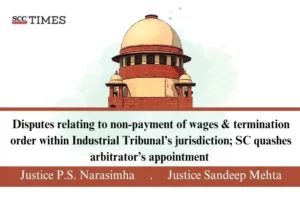Supreme Court: In a civil appeal by an employee challenging the decision of the Madras High Court appointing an arbitrator under Section 11(6) of the Arbitration and Conciliation Act, 1996 (‘Act’), the Division Bench of PS Narasimha* and Sandeep Mehta, JJ. held that Section 11(6) under the Act had two facets, the first relating to disputes that were anyway pending before the statutory authorities, and they related to non-payment of wages and legality and propriety of termination which are non-arbitrable; the second being the allegations of violation of clause 19 relating to non-disclosure obligation, which was not raised in the show cause notice, inquiry report, chargesheet and termination order, hence they were termed as- non-existent.
The Court allowed the appeal and set-aside the judgment and the order passed by the High Court and dismissed the petition under Section 11(6) filed by the employer under the Act.
Background
The appellant-employee was appointed as an Assistant Manager. Due to Covid-19 pandemic, the employee was asked to work from home from 22-03-2020 to 06-01-2021. However, the employer called upon the employee to physically attend office from August 2020. As the employee refused to comply, a show cause notice was issued on 04-09-2020, followed by an inquiry. The inquiry led to the issuance of a charge memo for violating certain contractual clauses related to non-cooperation and absenteeism. Ultimately, an order of termination was passed on 21-01-2021. Questioning the order of termination, the employee approached the Industrial Tribunal by filing a petition under Section 2(A) of the ID Act and the same is pending adjudication and determination by the Industrial Tribunal. The employer approached the High Court by filing a petition under Section 11(6) of the Act seeking the appointment of an arbitrator. The disputes between the employer and employee related to the non-payment of wages and also the legality and validity of the termination order.
The appellant’s case was that the dispute with the respondent employer- Hyundai AutoEver India Pvt. Ltd. was governed by statute under the Payment of Wages Act, 1936 (‘PW Act’) and the Industrial Disputes Act, 1947 (‘ID Act’).
Analysis and Decision
Perusing the termination notice, the Court noted that there was no allegation that the employee violated clause 19 of the appointment order leading to the order of termination. During the pendency of disciplinary action, as the employee was not paid his salary, he issued a legal notice for payment of wages and filed a petition under Section 15(2) of the PW Act. The employer issued a notice alleging that the disputes must be settled through arbitration and proceeded to unilaterally appoint an arbitrator. The Court also noted that as the unilaterally appointed arbitrator commenced the arbitral proceedings, the employee filed an application under Section 16 of the Act calling upon the arbitrator to rule on his competence. However, the arbitrator himself passed an order on 01-05-2022 considering the decision of this Court in Perkins Eastman Architects DPC v. HSCC (India) Ltd. (2020) 20 SCC 760 and closed the arbitral proceedings.
Regarding the allegation of violation of non-disclosure obligations under clause 19 of the appointment order, the Court pointed out that the issue relating to this violation was evidently not the ground when the employer issued the show cause notice, nor was it a part of the inquiry report. The Court stated that the termination was not based on any such allegation as evident from the termination order. Hence, the Court concluded that there was no dispute about the violation of non-disclosure obligations and Section 11(6) petition, to this extent was non-existent.
Regarding other disputes relating to non-payment of wages and the legality and validity of the order of termination, the Court noted that the employee approached the Authority under the PW Act much before the order of termination and the said authority would exercise jurisdiction under Section 15(2) of the PW Act to the exclusion of civil courts and these disputes are non-arbitrable. The Court added that the legality of the order of termination is within the jurisdiction of the Industrial Tribunal under Section 2(A) of the ID Act and the jurisdiction of the Industrial Court is also to the exclusion of the civil courts and is not arbitrable.
Therefore, the Court held that the filling of the Section 11(6) petition was an abuse of process with an intention to threaten the employee for having approached the statutory authorities under the PW Act and the ID Act. There is no basis for invoking clause 19 of the agreement and demanding compensation of Rs. 14,02,822/- when that fact situation did not arise.
[Dushyant Janbandhu v. Hyundai Autoever India (P) Ltd., 2024 SCC OnLine SC 3691, decided on: 11-12-2024]
*Judgment Authored by: Justice PS Narasimha

